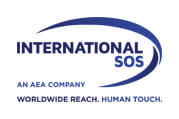New Research Reveals Shortfalls in Hotel Safety Planning
Alexandria, Va. and London
Latest study from ACTE Global and International SOS offers insights into where travel managers can improve their hotel programmes
The business travel landscape continues to rapidly evolve, with security threats constantly emerging in new locations, businesses expanding into developing markets, and accommodation options multiplying. But according to a new guide from ACTE Global (Association of Corporate Travel Executives) and International SOS, “Hotel Safety: A Guide to Staying Safe for Employers & Travellers”, many corporate travel programmes are unprepared to address the unique safety challenges associated with their accommodation policies. In fact, Ipsos MORI data finds that just 19% of organisations implemented safety and security checks for accommodations in 20171.

“Hotel security is an often-overlooked component in Duty of Care,” said Greeley Koch, executive director of ACTE Global. “It simply is not enough to create security policies based only on air travel and location-based threat assessments. Even some places we would consider ‘safe’ have experienced serious terrorist attacks on hotels. Travel managers must understand the importance of making sure their travellers are safe at every stop on their itinerary, from the airport to the convention centre to the hotel.”
James Wood, Security Director at International SOS and Control Risks added, “Organisations are increasingly sending travellers to higher risk locations, but security and safety considerations are not keeping pace with commercial priorities. Businesses across industries are growing their footprints in medium to extreme risk destinations, but the majority of decision makers are not taking the time to implement hotel safety and security checks.”
Key findings and case studies from the guide include:
Inadequate hotel safety programmes lead to negative business outcomes…
Overall, the guide finds that failing to implement hotel security checks, not only affects traveller wellbeing – it can also be costly. Litigation and damages can have a significant impact on businesses’ bottom line, whether or not a case is adjudicated in the employer’s favour. Labour and employment law firm, Fisher Phillips, reports a case in which an organisation paid damages of $300,000 to the spouse of an employee severely injured while staying overseas.
…but a strong programme can generate meaningful savings and employee morale.
Implementing hotel safety and security checks entails information gathering and analysis that allows organisations to make smarter decisions, both before a trip and during travel. In one International SOS case study, a school was able to save more than $96,000 by securing a medical service – including an on-site doctor – in advance of a trip during which several students fell ill. This advance planning and understanding of their options for on-site treatment at the hotel itself allowed them to act quickly and avoid a costly evacuation.
For more information and tips on building a hotel safety programme, download “Hotel Safety: A Guide to Staying Safe for Employers & Travellers” here.
ENDS
About ACTE Global
ACTE Global (Association of Corporate Travel Executives) has a 30-year reputation for leading the way corporate travel is conducted. As a global association comprised of executive-level members in more than 100 countries, ACTE Global pioneers educational and technological advances that make business travel productive, cost-effective and straightforward. ACTE Global advocacy and initiatives continue to support impactful changes in safety and security, privacy, duty of care and compliance along with traveller productivity that supports global commerce.
Learn more at www.acte.org.
Additional Resources
International SOS has released a video on assessing the safety of hotels abroad.
In addition, ACTE Global has introduced the Business Conference Hotels Accreditation (BCHA) accreditation to help travel managers assess hotel safety and other features for their business travellers. More information is available here.
About the International SOS Group of Companies
The International SOS Group of Companies is in the business of saving lives, protecting your global workforce from health and security threats. Wherever you are, we deliver customised health, security risk management and wellbeing solutions to fuel your growth and productivity. In the event of extreme weather, an epidemic or a security incident, we provide an immediate response providing peace of mind. Our innovative technology and medical and security expertise focus on prevention, offering real-time, actionable insights and on-the-ground quality delivery. We help protect your people, your organisation's reputation, as well as support your compliance reporting needs. By partnering with us, organisations can fulfil their Duty of Care responsibilities, while empowering business resilience, continuity and sustainability.
Founded in 1985, the International SOS Group, headquartered in London & Singapore, is trusted by 12,000 organisations, including the majority of the Fortune 500, as well as mid-size enterprises, governments, educational institutions and NGOs. 12,000 multicultural medical, security and logistics experts stand with you to provide support & assistance from over 1,000 locations in 90 countries, 24/7, 365 days.
To protect your workforce, we are at your fingertips: www.internationalsos.com
Notes to Editors
1 Ipsos MORI Global Business Resilience Trends Watch 2018

